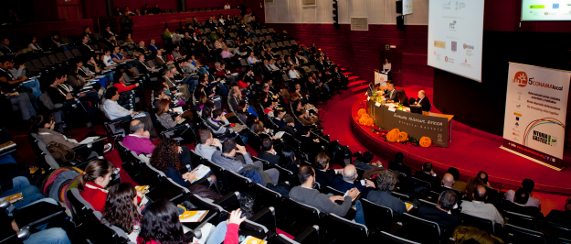Declaration of Vitoria-Gasteiz

Declaration of Vitoria-Gasteiz, Green Capital 2012, read at the end of the 5th Conama local.
Preamble
The scientific and technical committees of this 5th Conama Local, based on the ideas shared in the preparation of this meeting and on the issues raised during these days of discussions, understand:
-That given the ecological, social and economic-financial crisis situation that our country and other countries in the international arena have been experiencing in recent years, it is necessary, more than ever, to expand on the common vision of a sustainable future for our communities, as reflected in the Rio Summit in 1992 and in the principles embodied in 1994 in the Charter of European Cities & Towns Towards Sustainability, "the Aalborg Charter", subsequently ratified in continuous international agreements.
-That the need to respond to the challenges that the Global Change and related crises are generating requires urgent and determined actions and commitments.
-That, in the European Union, four out of every five people live in urban areas; this calls for cities to display a special sense of responsibility, not because of their significant contribution to environmental impacts, but because of the role they must play as key agents in reducing the local and global ecological footprint.
-That the urgent actions our country requires to promote the ailing labour market, to contain debt, correct financial imbalances and generate wealth should be considered as part of sustainable development challenges. Only if growth limits are considered and environmental, social and economic sustainability is integrated as an element of reference when designing policies and establishing the necessary actions to combat the crisis that besets us today, will we emerge from that crisis stronger, more skilled and solvent.
The new challenges
In the situation described above, we would like to point out that:
-The future scenarios that Spanish cities and towns will have to face, if there is no significant change of direction in local management issues, may lead to greater environmental and health impacts, as well as to a progressive deterioration of cohesion and of the social protection and welfare model for citizens and even to the decapitalising of the public natural heritage itself.
-Cities and towns should, therefore, be capable, in spite of their difficulties and limitations, to promote and implement the responses that society demands and sustainability requires. And it will hardly be possible to move toward a new urban paradigm by applying the logic of the past or basing solutions on technology alone.
-The approach to and the implementation of new targets will require the development of new principles of reference, because without renewing the logic and foundations, it will not be possible to build new urban models.
Cities and towns should move toward an urban metabolism of "closing cycles", by reducing unnecessary consumption and ecological impacts on urban processes, in addition to maintaining the social coverage achieved to date and respond to new needs that the population may have at all age and social levels, paying special attention to the fight against unemployment.
Our commitment
In order to find the formulas that will solve immediate needs without compromising the future, a creative process based on a dialogue between all the stakeholders involved and on the support of networks will be required.
Consequently, after this Conama Local meeting that has been our first encounter within this context, we understand that it is necessary and urgent to continue working to:
-Promote land and urban planning and development to respond to social needs and to the challenge of reducing the ecological footprint of our cities; avoiding indiscriminate occupation of land and recovering a cohesive and diverse urban fabric.
-Banish the instruments or practices that may lead to speculative processes in relation to the land or associated environmental assets and services.
-Configure more intelligent, low-carbon cities, which achieve net savings on energy consumption and that incorporate distributed generation systems based on renewable energies, as a contribution to the fight against climate change.
-Promote a new building sector that will recover its social function and incorporate bioclimatic and maximum energy efficiency criteria, based on the rehabilitation of existing buildings and the revitalization of neighbourhoods.
- Promote sustainable mobility and accessibility for all in our cities while minimizing the harmful effects derived from transport (and the infrastructure transport systems require), such as air pollution, noise, congestion and the fragmentation of the urban fabric.
-Promote actions to recover urban biodiversity, integrating nature into the cities, making it available at an accessible distance for all citizens, and enhance biocapacity as a cushioning system to counter urban environmental impacts.
-Move towards healthy cities, with facilities and services that promote proximity, where the public space assumes its full dimension as an element of social relationship.
-Streamline incidence in the water cycle and its impact on nature and, in particular, the consumption of drinking water to avoid wasting water while promoting its reuse.
-Reduce waste generation by establishing "zero waste" targets and especially stressing the need to minimise the generation of waste.
-Encourage new forms of citizen participation with a view to improving the effectiveness of current systems, both in planning processes and in urban transformation and management, placing the necessary instruments at the disposal of society to facilitate their involvement and their access to information.
-Combat social exclusion caused by unemployment, the ghettoisation of minorities, the progressive aging of the population or problems arising from isolation.
We call upon
Assuming the complexity and scale of the problems that beset us and on the understanding that the solution to these does not only lie in local capabilities and local expertise, we urge:
-the public administrations of the Autonomous Regions, the new Spanish Government and the European Union to enter into a commitment to coordinate and support local sustainable development policies by taking into consideration, in supramunicipal decision-making, the approaches and demands of local authorities, and providing them with the necessary tools to be able to develop this task.
-local administrations to take a step forward and, within a framework of collaboration and cooperation, to go beyond partial measures and programmes and to meet the challenges of sustainability in a comprehensive manner, with specific medium and long-term strategies and commitments and the tools for monitoring progress.
-Equally, we call upon the citizens and their associations to become involved in participatory processes and to cooperate with and demand from the public authorities compliance with their promises and commitments in the field of sustainability.











